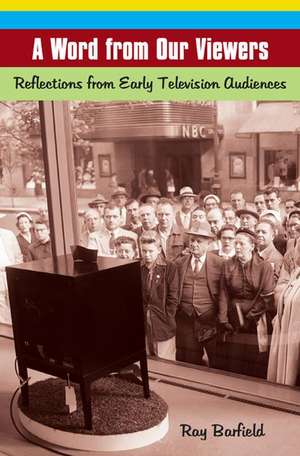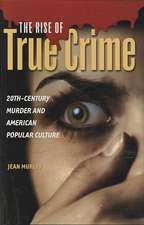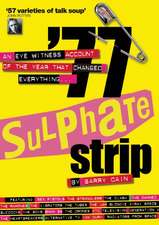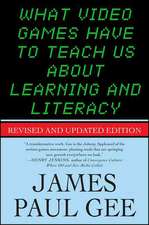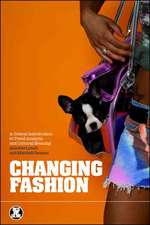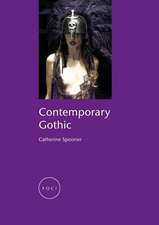A Word from Our Viewers: Reflections from Early Television Audiences
Autor Ray Barfielden Limba Engleză Hardback – 29 noi 2007 – vârsta până la 17 ani
Preț: 319.92 lei
Preț vechi: 391.23 lei
-18% Nou
Puncte Express: 480
Preț estimativ în valută:
61.21€ • 63.92$ • 50.55£
61.21€ • 63.92$ • 50.55£
Carte tipărită la comandă
Livrare economică 16-30 aprilie
Preluare comenzi: 021 569.72.76
Specificații
ISBN-13: 9780275998707
ISBN-10: 0275998703
Pagini: 176
Dimensiuni: 156 x 235 x 18 mm
Greutate: 0.42 kg
Editura: Bloomsbury Publishing
Colecția Praeger
Locul publicării:New York, United States
ISBN-10: 0275998703
Pagini: 176
Dimensiuni: 156 x 235 x 18 mm
Greutate: 0.42 kg
Editura: Bloomsbury Publishing
Colecția Praeger
Locul publicării:New York, United States
Notă biografică
Ray Barfield is Professor of English at Clemson University and is the author of Listening to Radio, 1920-1950 (Praeger, 1996). He is a contributor to The Greenwood Guide to American Popular Culture and The Museum of Broadcasting Encyclopedia of Radio, and he has authored numerous articles and conference papers on radio, cartoons, children's books, and 1920s' fads. He is also co-author of a business communications handbook.
Recenzii
Barfield provides An insightful, nostalgic look at the social role and history of television in American life-the changes it has brought to the majority of households and how it has affected the way people live. The book is in large part a collection of comments from early viewers-beginning in the 1920s-30s and continuing to the television boom in the 1950s-60s. It is all in these recollections: seven-inch screens, adjusting rabbit ears and the outside antenna to receive a signal, neighbors, friends, and relatives coming over to view our TV set, situation comedies, drama, test patterns when there was no programming, see-through color sheets, don't sit too close to the screen! and harvesting spaghetti from trees, a 1957 BBC April Fools' joke. Barfield also looks at advertising, local programming, the reactions of Americans living abroad and their experience as television viewers, and how critics, artists, and others responded to early television news programs. Recommended. All readers, all levels.
The literature on early television is composed mainly of institutional histories, memoirs from famous performers, and a never-ending spate of books devoted to classic programs from yesteryear. A Word From Our Viewers is a welcome addition to the field as it brings a new perspective into the mix: those of television viewers.
The literature on early television is composed mainly of institutional histories, memoirs from famous performers, and a never-ending spate of books devoted to classic programs from yesteryear. A Word From Our Viewers is a welcome addition to the field as it brings a new perspective into the mix: those of television viewers.
